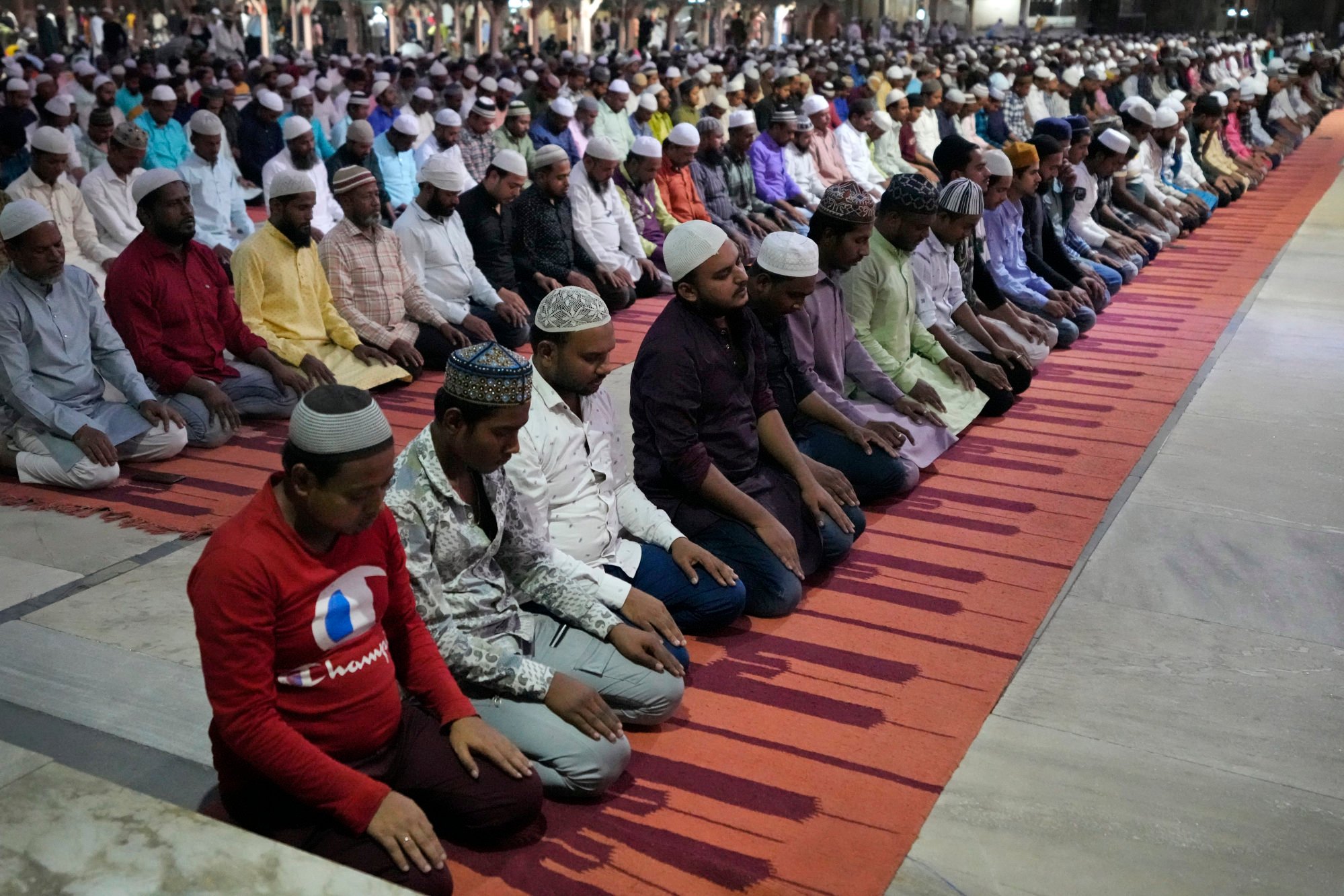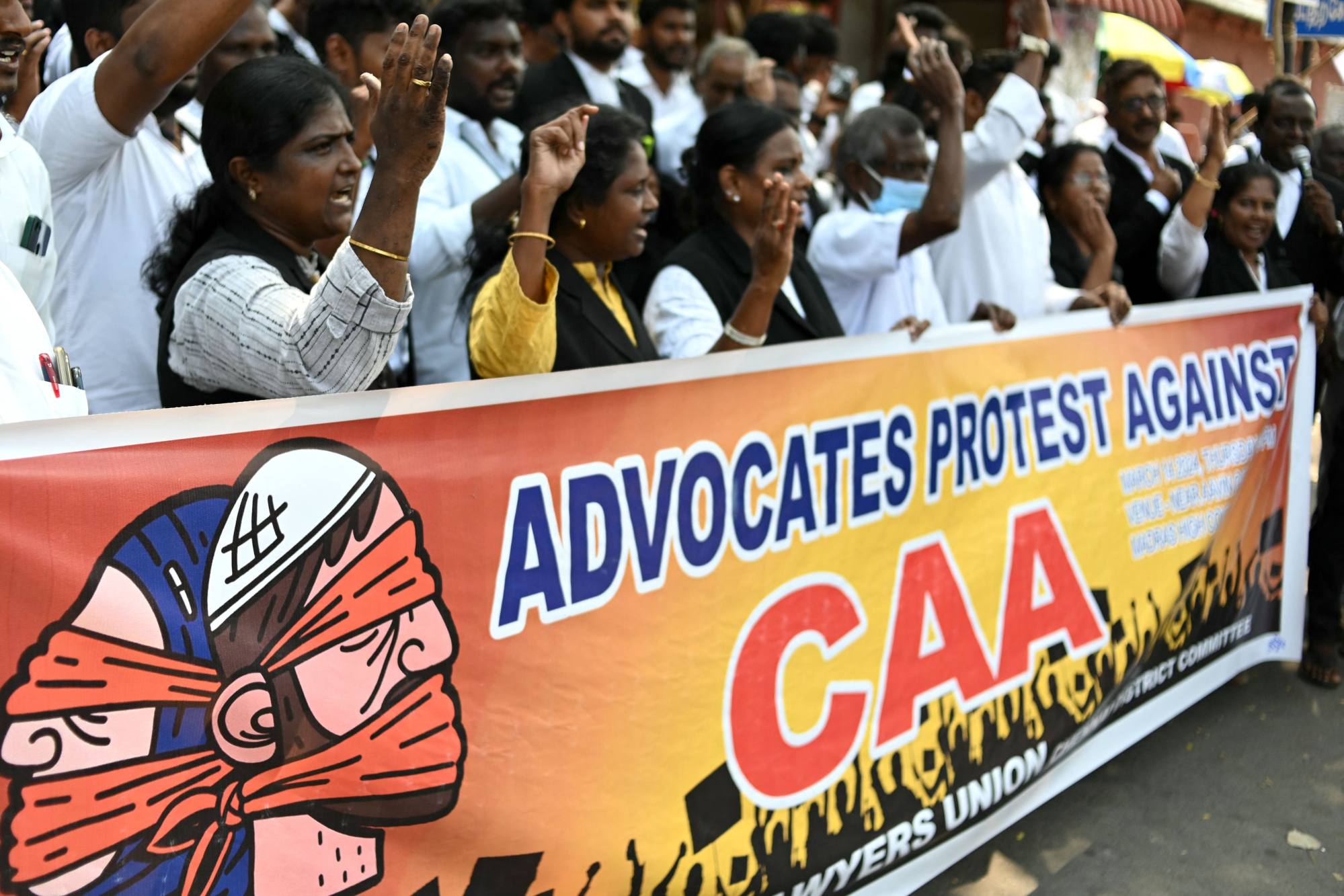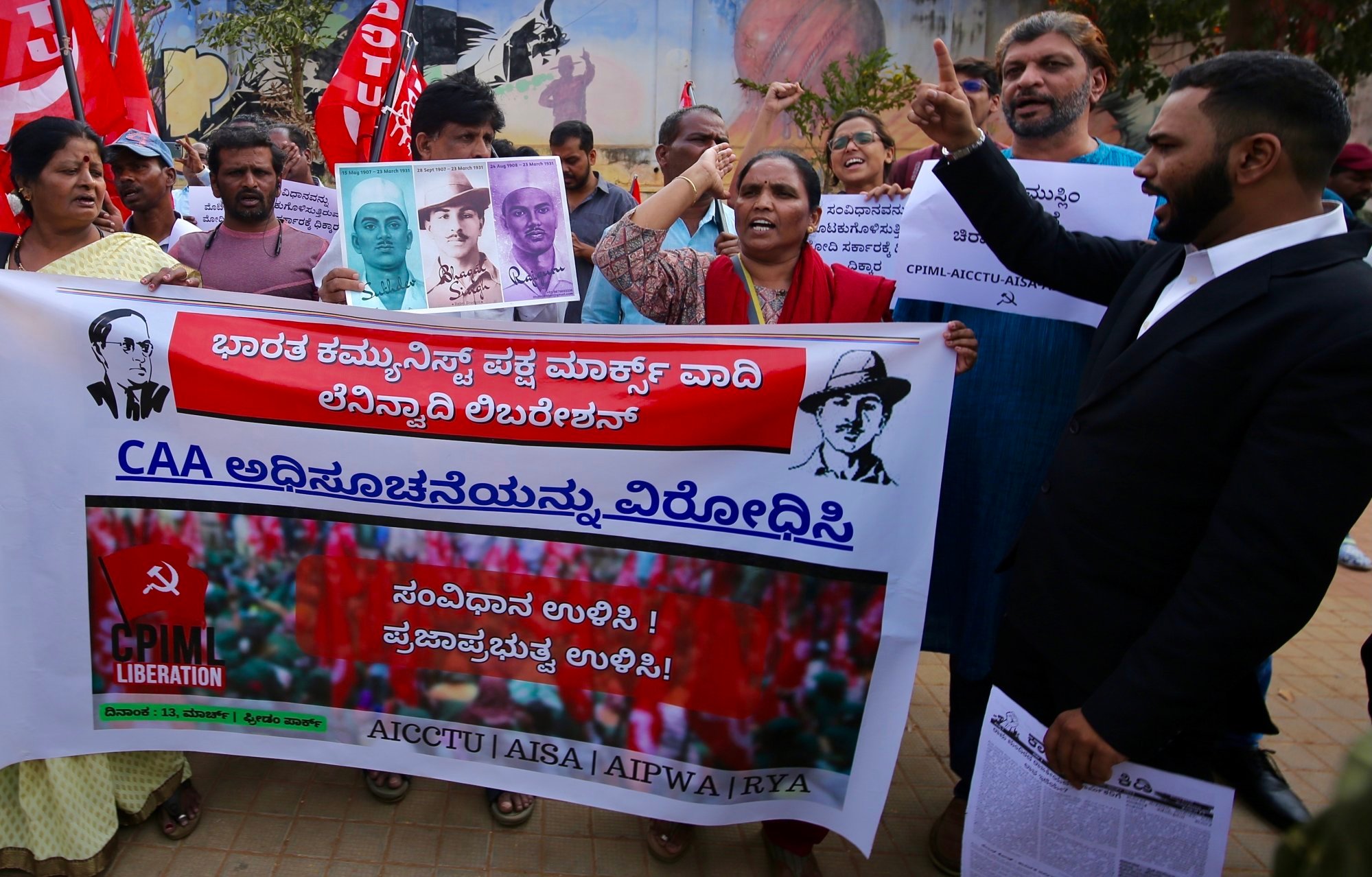India applies its controversial anti-Muslim law on the eve of elections
March 17, 2024

India will kick its exemplary secular legal system on the eve of the elections. The Government of Hindu nationalist Narendra Modi has ordered the implementation of a Citizenship Law that is better known as anti-muslim law. It was enacted two years ago and massive and deadly protests recommended putting it in the refrigerator. It is recovered by Modi when he seeks his third term in another Islamophobic attack that satisfies the Hindu majority.
The law of humanitarian wording and disturbing spirit, will grant Indian citizenship to illegal immigrants of various religious minorities (Hindus, Sikhs, Buddhists, Parsis, Jains and Christians) arriving from three Muslim-majority countries (Afghanistan, Bangladesh and Pakistan). The 11 years accredited in India will no longer be necessary, but it will be enough to prove arrival before 2015 to obtain the documents through an urgent procedure. If the law seeks to protect persecuted minorities, it is surprising that it does not include the Rohingyas of Myanmar, the Ahmadis of Pakistan or the Hazaras of Afghanistan. Muslims are excluded because, according to Modi, they are neither a minority nor do they need state protection.
Amnesty International maintains that the new law legitimizes discrimination based on religion and violates constitutional values of equality and human rights international. Some states where Modi’s party does not govern have announced that they will not apply it. It is a state-wide problem because the community of almost 200 million Muslims (the third largest in the world) is spread throughout the country. The law has also encouraged nativism, localism and indigenismmodern euphemisms for lifelong xenophobia.
Persecution and punishment
Modi’s Bharatiya Janata Party, representative of the Hindu right, has over the last decade undermined the secular principles of the world’s largest democracy. Religious minorities lament the persecution and punishment of dissidents. No group has suffered more than Muslims.. Just a month earlier, two mosques were demolished in New Delhi and the state of Uttarakhand. It was raining in the wet: Modi had inaugurated a Hindu temple in January where there was a mosque for 500 years until it was demolished by nationalists. Religious conflicts cyclically integrate the black chronicle. Muslims who allegedly ate cow meat, an animal sacred to Hindus, have been lynched. Their homes and businesses have been demolished by what is known as “picket justice” and boycotts are not strange. Some are already talking about a genocide.
Modi’s thunderous silence encourages outrages, analysts judge. From his party there are many combative references to Muslim refugees. The Ministry of the Interior defined them as “termites” and “infiltrators” that put national security at risk. Minorities also fear the National Register of Citizens with which India intends to identify and expel those without papers. It only works in the northern state of Assam but New Delhi wants to extend it to the entire country.
Police and paramilitaries have arrived to the northeast of New Delhi this week. The loudest protests broke out there when the law was enacted, although they ended up spreading to several states. They left more than a hundred dead and thousands arrested before Modi put a stop to it. The United States, Canada and the United Kingdom advised against the arrival of tourists to the country and the then Japanese president, Shinzo Abe, canceled his visit. It is not ruled out that social upheavals will return.
March 17, 2024

India will kick its exemplary secular legal system on the eve of the elections. The Government of Hindu nationalist Narendra Modi has ordered the implementation of a Citizenship Law that is better known as anti-muslim law. It was enacted two years ago and massive and deadly protests recommended putting it in the refrigerator. It is recovered by Modi when he seeks his third term in another Islamophobic attack that satisfies the Hindu majority.
The law of humanitarian wording and disturbing spirit, will grant Indian citizenship to illegal immigrants of various religious minorities (Hindus, Sikhs, Buddhists, Parsis, Jains and Christians) arriving from three Muslim-majority countries (Afghanistan, Bangladesh and Pakistan). The 11 years accredited in India will no longer be necessary, but it will be enough to prove arrival before 2015 to obtain the documents through an urgent procedure. If the law seeks to protect persecuted minorities, it is surprising that it does not include the Rohingyas of Myanmar, the Ahmadis of Pakistan or the Hazaras of Afghanistan. Muslims are excluded because, according to Modi, they are neither a minority nor do they need state protection.
Amnesty International maintains that the new law legitimizes discrimination based on religion and violates constitutional values of equality and human rights international. Some states where Modi’s party does not govern have announced that they will not apply it. It is a state-wide problem because the community of almost 200 million Muslims (the third largest in the world) is spread throughout the country. The law has also encouraged nativism, localism and indigenismmodern euphemisms for lifelong xenophobia.
Persecution and punishment
Modi’s Bharatiya Janata Party, representative of the Hindu right, has over the last decade undermined the secular principles of the world’s largest democracy. Religious minorities lament the persecution and punishment of dissidents. No group has suffered more than Muslims.. Just a month earlier, two mosques were demolished in New Delhi and the state of Uttarakhand. It was raining in the wet: Modi had inaugurated a Hindu temple in January where there was a mosque for 500 years until it was demolished by nationalists. Religious conflicts cyclically integrate the black chronicle. Muslims who allegedly ate cow meat, an animal sacred to Hindus, have been lynched. Their homes and businesses have been demolished by what is known as “picket justice” and boycotts are not strange. Some are already talking about a genocide.
Modi’s thunderous silence encourages outrages, analysts judge. From his party there are many combative references to Muslim refugees. The Ministry of the Interior defined them as “termites” and “infiltrators” that put national security at risk. Minorities also fear the National Register of Citizens with which India intends to identify and expel those without papers. It only works in the northern state of Assam but New Delhi wants to extend it to the entire country.
Police and paramilitaries have arrived to the northeast of New Delhi this week. The loudest protests broke out there when the law was enacted, although they ended up spreading to several states. They left more than a hundred dead and thousands arrested before Modi put a stop to it. The United States, Canada and the United Kingdom advised against the arrival of tourists to the country and the then Japanese president, Shinzo Abe, canceled his visit. It is not ruled out that social upheavals will return.
India’s citizenship law slammed as anti-Muslim, Modi’s election ploy to woo Hindu voters
March 17, 2024
by Kofi Jane

These refugees can acquire Indian citizenship within five years even if they enter the country without papers.
India’s Home Minister Amit Shah on March 11 announced details about the implementation of the CAA. Shah, a close Modi aide, said on X the CAA would “enable minorities persecuted on religious grounds in neighbouring countries to acquire Indian citizenship”.

These refugees can acquire Indian citizenship within five years even if they enter the country without papers.
India’s Home Minister Amit Shah on March 11 announced details about the implementation of the CAA. Shah, a close Modi aide, said on X the CAA would “enable minorities persecuted on religious grounds in neighbouring countries to acquire Indian citizenship”.
Critics have slammed the delayed implementation of the law by four years, saying it was deliberately timed just before the election. On Saturday, India’s election authority said polls would begin in phases on April 19.
The 2019 demonstrations triggered a crackdown and led to the deaths of more than 100 people, mainly Muslims. Several Muslim scholars accused of inciting violence at the protests were also arrested and jailed.
Is India targeting Muslims with committee to address population growth?
The law’s implementation on March 11, just weeks before Modi seeks an unprecedented third term in the election, has reignited fears of the Hindu nationalist Bharatiya Janata Party’s (BJP) alleged anti-Muslim bias.
Protests erupted across India, including in Delhi, following Shah’s announcement. Government forces were deployed in recent days to quell the unrest in Muslim-majority areas in the capital. Activists from various organisations staged demonstrations, burning copies of the law.
Legal experts say the rules would make India a sanctuary for Hindus and marginalise its 200-million Muslim minority. Before the CAA, an applicant’s faith was not specified by the authorities and a foreigner could be eligible for Indian citizenship after 11 years of residence.
Critics noted that the CAA ignores persecuted Muslim individuals overseas such as Hazara Muslims in Afghanistan, Ahmadis in Pakistan or Rohingyas in Myanmar, many of whom have been detained in India after fleeing their countries. Amnesty India said in a post on X on March 14 that the CAA violates constitutional principles of equality.
Since assuming power in 2014, the BJP has faced criticisms for fostering a hostile climate against Muslims in India. Over the past decade, many Muslim Indians have accused authorities of human rights abuses ranging from property demolitions to attacks on religious sites.
Political analysts and rights advocates say the government has prioritised electoral gains over addressing the country’s economic challenges.
Lawyer Aman Wadud said the CAA was discriminatory against Muslims, and dismissed claims by Delhi that the new law gave refuge to religiously persecuted communities.
“Any illegal immigrants from six non-Muslim communities can seek citizenship, regardless of persecution. The talk of religious persecution is mere political rhetoric,” Aman told This Week in Asia.
“Look at statements from BJP leaders like the Assam Chief Minister calling all Muslims ‘Bangladeshis’. They are persecuting Muslims here through such laws and rhetoric that paints them as outsiders.”
 Muslims pray after breaking their fast together by sharing a meal in the courtyard of Jama Masjid on the first Friday of the holy month of Ramadan in Ahmedabad, India, on March 15. Photo: AP
Muslims pray after breaking their fast together by sharing a meal in the courtyard of Jama Masjid on the first Friday of the holy month of Ramadan in Ahmedabad, India, on March 15. Photo: APA Delhi-based research fellow, who wished to remain anonymous, said the CAA and the National Register of Citizens (NRC) were part of the same divisive agenda by Modi’s BJP government.
The researcher said the NRC aimed to identify “undocumented immigrants” – a group the government had anticipated would be predominantly Muslim – by demanding documentation that many could not produce due to loss or damage over the years.
However, in Assam, when the NRC rules were implemented, most on the undocumented list were non-Muslims.
“The CAA cannot be seen in isolation. It’s one arm of the pincer while the other is the NRC. By launching them separately, the BJP tries to portray them as distinct but they are two arms of the same political endeavour.”

Members of All India Lawyers Union shout slogans as they protest against the implementation of the Citizenship Amendment Act at the Madras High Court in Chennai on March 14.
Photo: AFP
Safoora Zargar, a Muslim student activist, said the move to implement the CAA ahead of the 2024 elections was a sign of Delhi’s weakness and urged activists to continue defending Indian democracy.
“The government has to resort to such overt vulgar displays of power to give reason to its voter base to vote for them again despite all the failures,” she told This Week in Asia.
The CAA has also drawn international criticisms since it was mooted.
The UN Office of the High Commissioner for Human Rights expressed concerns earlier this week over the law’s discriminatory nature, saying India might have breached its international human rights obligations.
US State Department spokesman Matthew Miller earlier this week emphasised the importance of religious freedom and equal treatment under the law for all communities in India, saying Washington was monitoring the situation closely to gauge the impact of the CAA.

Safoora Zargar, a Muslim student activist, said the move to implement the CAA ahead of the 2024 elections was a sign of Delhi’s weakness and urged activists to continue defending Indian democracy.
“The government has to resort to such overt vulgar displays of power to give reason to its voter base to vote for them again despite all the failures,” she told This Week in Asia.
The CAA has also drawn international criticisms since it was mooted.
The UN Office of the High Commissioner for Human Rights expressed concerns earlier this week over the law’s discriminatory nature, saying India might have breached its international human rights obligations.
US State Department spokesman Matthew Miller earlier this week emphasised the importance of religious freedom and equal treatment under the law for all communities in India, saying Washington was monitoring the situation closely to gauge the impact of the CAA.

Members of All India Students’ Association and other non-governmental organisations protest against the implementation of the Citizenship Amendment Act (CAA), in Bengaluru, India, on March 13.
Photo: EPA-EFE
However, India’s Ministry of External Affairs spokesman Randhir Jaiswal on Saturday said the CAA was “an internal matter of India, aligned with our inclusive traditions and our enduring commitment to human rights”. The US and UN reactions were “misplaced, misinformed and unwarranted”, he added.
Neighbouring Pakistan has lambasted the law as discriminatory, with its foreign office spokesman Mumtaz Zahra Baloch on Friday calling India a “Hindu fascist state”.
Dr Zafarul-Islam Khan, a former chairman of the Delhi Minorities Commission, said the implementation of the CAA was to “exploit” communal divisions for electoral gains and further undermined the status of Indian Muslims.
He warned, “More steps will follow until Indian Muslims are finally turned into second-class citizens.”
However, India’s Ministry of External Affairs spokesman Randhir Jaiswal on Saturday said the CAA was “an internal matter of India, aligned with our inclusive traditions and our enduring commitment to human rights”. The US and UN reactions were “misplaced, misinformed and unwarranted”, he added.
Neighbouring Pakistan has lambasted the law as discriminatory, with its foreign office spokesman Mumtaz Zahra Baloch on Friday calling India a “Hindu fascist state”.
Dr Zafarul-Islam Khan, a former chairman of the Delhi Minorities Commission, said the implementation of the CAA was to “exploit” communal divisions for electoral gains and further undermined the status of Indian Muslims.
He warned, “More steps will follow until Indian Muslims are finally turned into second-class citizens.”
India’s Controversial Citizenship Law Slammed by Opposition
Swati Gupta
Mon, March 11, 2024

(Bloomberg) --
India implemented a religion-based law that’s seen as discriminatory toward Muslims, sparking a backlash from opposition parties, who accused Prime Minister Narendra Modi’s government of polarizing voters weeks before elections.
The Citizenship (Amendment) Act — which fast-tracks citizenship rights for immigrants from neighboring nations except for those who identify as Muslim — was enacted through a notification in the Gazette of India on Monday. Although the law was passed more than four years ago, it takes effect just days before India is expected to announce its election dates.
Questioning the timing of the notification of the rules just before the elections, Jairam Ramesh, the spokesperson for the Indian National Congress said it’s “evident that it is being done to polarize the elections.” Leaders in opposition-controlled states like Kerala and Tamil Nadu also slammed the move as divisive, vowing to oppose it.
The CAA prioritizes citizenship for Hindus, Sikhs, Buddhists and people of several other faiths from three neighboring Muslim-majority countries — Pakistan, Bangladesh and Afghanistan — who entered India before 2015. The Ministry of Home Affairs said Monday applicants can apply for citizenship through a web portal.
When the law was passed in 2019, it triggered violent protests and panic among many Indians who risked becoming stateless without proper documentation. The law is seen as a precursor to a proposed population register, which will require Indians to prove their citizenship.
If that happens, critics fear that Muslims who immigrated from the three neighboring countries and who have lived in India for decades without official papers may be deported or placed in detention camps. In Assam, which borders Bangladesh and is the only state that’s implemented a population register, 1.9 million people were rendered stateless by the process.
Modi has previously denied that the CAA law discriminates against Muslims. His ruling Bharatiya Janata Party is widely expected to return to power, buoyed by strong support from its majority Hindu base.
Opposition parties and state chief ministers issued statements Monday criticizing the timing and the motivation behind the government’s move.
“This is to divide the people, incite communal sentiments and undermine the fundamental principles of the Constitution,” Pinarayi Vijayan, Kerala’s chief minister, said in a post on social media platform X. “This move to stratify Indian citizens who have equal rights, must be opposed unitedly.” He added that the CAA won’t be implemented in his state.
Amit Shah, India’s home minister who has been a fierce advocate of the CAA, posted on X that the enactment of the law fulfills one of Modi’s promises, and would allow persecuted minorities in neighboring countries to acquire citizenship in India.
Opposition groups and activists fear the BJP will expand the population register in Assam to other states, as it’s promised. That would strip rights from tens of millions of Indians until they gain residency again through the CAA, although that path wouldn’t apply to Muslims.
According to the most recent census, Hindus account for 80% of India’s population of 1.4 billion, while Muslims make up about 14%.
Bloomberg Businessweek
No comments:
Post a Comment